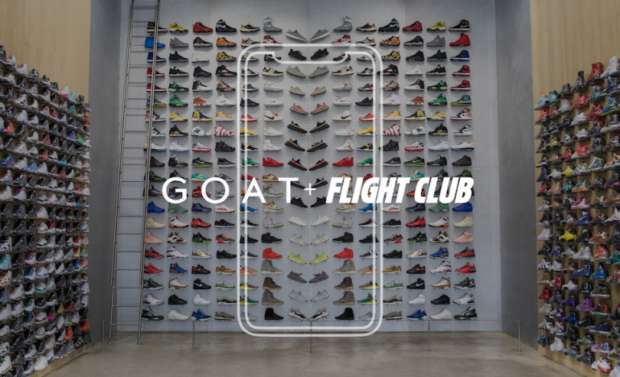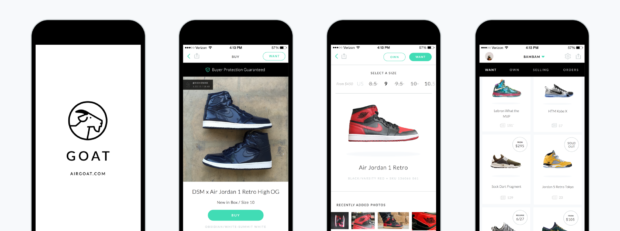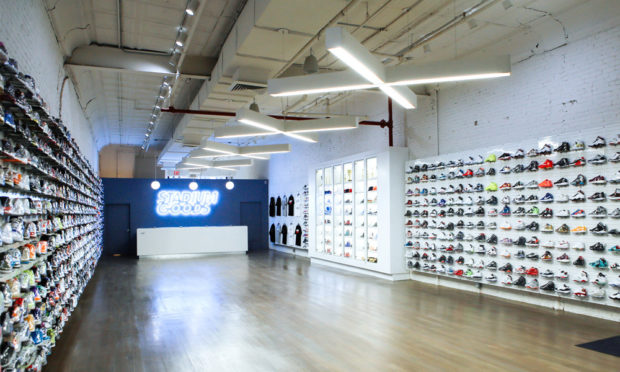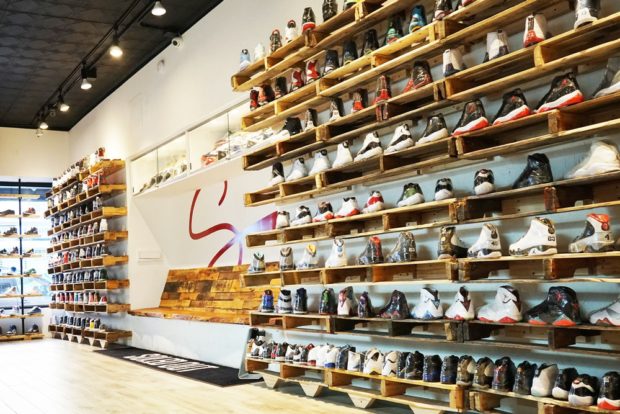GOAT and Flight Club. Two behemoths of the sneaker resell industry. One an old standby with a heavy physical retail presence, one a new-jack online only peer to peer marketplace. Both boast a devoted following, a high degree of name recognition in their market, and a massive amount of incredible sneakers for purchase, and now the two are combining into one colossal company.
That’s correct: GOAT and Flight Club are joining forces to create the single largest aftermarket sneaker empire in the world … and GOAT, not Flight Club will be the overarching parent company after raising $60 million dollars in capital (and a whopping $250 million dollar valuation) from venture capital firm Infunding.
The two businesses are nothing if not an odd couple of sorts, but they (and their investors) are counting on the probability that they’ll be able to push each other to new heights by sharing their expertise. Flight Club, which has been a mainstay in the world of aftermarket sneaker selling since 2005 when “aftermarket sneaker selling” was a completely alien term in greater business lexicon has been losing ground to fresher, more innovative companies like Stadium Goods that offer both an excellent in-store experience and a streamlined online shopping system.
That’s where GOAT comes in. Founded in 2015, they’ve become known for their innovative peer-to-peer buying and selling system, similar to successful online menswear boutique Grailed. Since they connect the buyer and seller directly, they can offer both new and used shoes, something a traditional consignment shop can’t typically do. Their buying and selling process? It’s fast, safe, flexible and affordable. The average price of a sneaker on GOAT? $330. The average price of a sneaker on Flight Club? $400.
The partnership with GOAT will enable Flight Club to expand their online presence in a way that they’ve struggled to do, and will enable GOAT to have a presence (alibet a mostly invisible behind-the-scenes one) in the world of physical retail. As the deal between the two companies is entirely on the back end, they’ll remain completely separate, but gain the ability to share their greatest strengths with one another, hypothetically launching each company’s sales and success even further into the sneaker resell stratosphere.
Why this partnership between the two so important for their respective businesses? Because most brands and shops in the sneaker and streetwear sphere do one thing really well. Either they have a massive online presence, or their shop is a must-visit destination for any gear nut or sneaker collector. Rarely does a company do both ends of the business very well, and with an online powerhouse now fused with an icon in physical retail, GOAT and Flight Club now have the potential to be at the top on both ends of the spectrum.
Although many news outlets, business analysts, and hypebeasts who get everything they own online would tell you that physical retail is dying a slow and painful death as the reach and influence of the internet continues to grow with each passing year, GOAT’s co-founder Dashin Sugno believes that the physical retail experience is still as important as ever, stating recently “In this day and age, to be impactful and to bring access to people you need a digital experience but you also need to have a brick and mortar experience.” He also shrugs off Flight Club’s notoriously high price points, noting “Consumers tend to spend more money in a retail environment when they experience a product in real life.”
Editor’s Note: As someone who has spent a significant amount of time working in a streetwear and sneaker boutique, I can say without a moment’s hesitation that Dashin Sugno’s words ring true. Savvy customers are still willing to pay a premium for a physical experience in our digitally-driven world because they enjoy being able to touch, feel, try on, and purchase rare goods in person even if they know they could likely find them for cheaper online. The amount of times I heard something along the lines of “I’ve always wanted (hyped shoe/rare clothing item), but I never knew how it fit or how it would look” when someone made a purchase? I can’t even keep track.
The merger will also give GOAT and Flight Club the chance to expand their markets into territories previously untapped by aftermarket parties like Australia and Asia. Stadium Goods was the first to set down roots in Asia due to a partnership with commerce giant Alibaba that enabled them to sell their products to Chinese consumers without having to operate a physical location, but now their international monopoly may face some new competition, which only brings more value to the market.
So what does this mean for the resell market as a whole? To answer the question originally posed in the headline of this article: the merger between Flight Club and GOAT is a ground-breaking cultural moment. It means that the aftermarket for goods that were once only coveted by those “in the know” is more expansive and expensive than ever, and street fashion and sneakers are beginning to cash in on the fervent followings that they’ve garnered with their unique aesthetic and clever marketing. With partnerships like these, and seed money being invested in brands like Supreme, Huf, and A Cold Wall, a once-humble subculture is humble no more.
With the infusion of venture capital money being brought to the table, the rich will get richer, and the little guys (smaller shops and businesses) will have to work twice as hard to remain unique and offer something that the giants of the industry do not. Can’t beat someone on selection? You’ve gotta beat them on aesthetic. Innovation never stops or sleeps, and now that there’s even more money up for grabs in the sneaker game, we’ll see even more small businesses finding unique ways to acquire and sell product as well as offer an experience that’s unique for their customers. Necessity is the mother of invention, so don’t be surprised when you see even more unique concepts and marketing from retailers in 2018.
As far as the desire for the product itself goes? There’s no signs to show that the desire for limited-edition kicks and gear will be slowing down any time soon either. Detractors and out-of-touch analysts may say that the resell bubble has to burst sooner or later, but limited aftermarket gear offer much more staying power than fast-fashion athleasure or Americana, two recent trends that blew up and then fell fast. When will a limited-edition pair of kicks not be desirable? As long as supply outweighs demand and a service fee can be tacked on to any aftermarket purchase, either online or physical … there’s plenty of money to be made for all parties involved.
We don’t know where the sneaker industry is headed next as a whole and what the next step in the evolution of the aftermarket will be, but we do know that it’s going to be one hell of an interesting entrepreneurial ride, no matter where it may wind up. Fasten your seatbelt: 2018 may mark the start of a completely new aftermarket marketplace.
What do you think of the merger between GOAT and Flight Club? Do you think that all the venture capital money that’s pouring into aftermarket products and the rest of the industry is bad for streetwear and sneaker culture as a whole, or is it simply the natural progression of a once-humble subculture? Sound off in the comments or hit us up and let us know on Twitter!
Share KicksOneTwo




